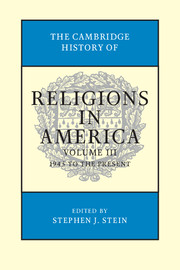Book contents
- Frontmatter
- SECTION I THE POSTWAR RELIGIOUS WORLD, 1945 AND FOLLOWING
- SECTION II CONTROVERSIAL ISSUES IN TRANSITIONAL TIMES
- SECTION III THE WORLD’s RELIGIONS IN AMERICA
- SECTION IV RELIGIOUS AND CULTURAL CONFLICT IN AMERICA
- SECTION V NEW AND CONTINUING RELIGIOUS REALITIES IN AMERICA
- 26 Post 9/11: America Agonizes over Islam
- 27 The Megachurch Phenomenon: Reshaping Church and Faith for the Twenty-First Century
- 28 Roman Catholicism in America at the Beginning of the Twenty-First Century
- 29 New Technologies
- 30 Reading Race and American Televangelism
- 31 Religion, Government, and Law in the Contemporary United States
- 32 Religious Thought in America: 1945 to the Present
- 33 Religion and Missions
- SECTION VI CONCLUDING ESSAYS
- Index
- References
31 - Religion, Government, and Law in the Contemporary United States
from SECTION V - NEW AND CONTINUING RELIGIOUS REALITIES IN AMERICA
Published online by Cambridge University Press: 28 July 2012
- Frontmatter
- SECTION I THE POSTWAR RELIGIOUS WORLD, 1945 AND FOLLOWING
- SECTION II CONTROVERSIAL ISSUES IN TRANSITIONAL TIMES
- SECTION III THE WORLD’s RELIGIONS IN AMERICA
- SECTION IV RELIGIOUS AND CULTURAL CONFLICT IN AMERICA
- SECTION V NEW AND CONTINUING RELIGIOUS REALITIES IN AMERICA
- 26 Post 9/11: America Agonizes over Islam
- 27 The Megachurch Phenomenon: Reshaping Church and Faith for the Twenty-First Century
- 28 Roman Catholicism in America at the Beginning of the Twenty-First Century
- 29 New Technologies
- 30 Reading Race and American Televangelism
- 31 Religion, Government, and Law in the Contemporary United States
- 32 Religious Thought in America: 1945 to the Present
- 33 Religion and Missions
- SECTION VI CONCLUDING ESSAYS
- Index
- References
Summary
In two decisions of the 1940s, Cantwell v. Connecticut and Everson v. Board of Education, the Supreme Court foreshadowed the dominant role that it would play in defining the relationship between religion and government in the contemporary United States. In these cases, the court offered new and important interpretations of the religion clauses of the First Amendment (the Establishment and Free Exercise clauses), which state that “Congress shall make no law respecting an establishment of religion, or prohibiting the free exercise thereof.” Notably, the court ruled that these provisions, applicable by their terms only to the federal government, henceforth would be applied to the states as well, including their local subdivisions. In so holding, the court concluded that the Fourteenth Amendment, which explicitly addresses the states, incorporated the First Amendment’s religion clauses by reference. The court earlier had ruled likewise concerning the First Amendment’s free speech provisions, meaning that after Cantwell and Everson, the states effectively were bound by the First Amendment no less than the federal government.
Cantwell, decided in 1940, protected the right of Jehovah’s Witnesses to promote their faith through sidewalk evangelism and soliciting in a heavily Roman Catholic neighborhood, even though their appeals included provocative and strongly worded attacks on the Catholic religion. Invalidating the Connecticut laws under which the defendants had been convicted, the Supreme Court cited not only the Free Exercise Clause, which specifically addresses religion, but also the Free Speech Clause, which more generally forbids laws that “abridg[e] the freedom of speech.”
- Type
- Chapter
- Information
- The Cambridge History of Religions in America , pp. 648 - 673Publisher: Cambridge University PressPrint publication year: 2009



